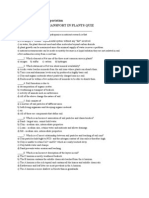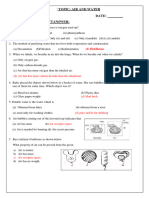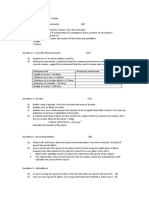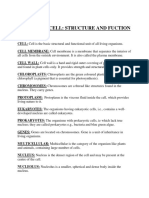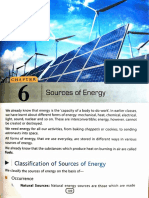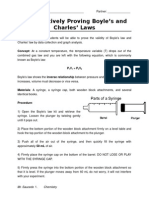0 ratings0% found this document useful (0 votes)
12K views5th Grade Quiz Week 3
5th Grade Quiz Week 3
Uploaded by
api-254428474Copyright:
© All Rights Reserved
Available Formats
Download as DOCX, PDF, TXT or read online from Scribd
5th Grade Quiz Week 3
5th Grade Quiz Week 3
Uploaded by
api-2544284740 ratings0% found this document useful (0 votes)
12K views3 pagesOriginal Title
5th grade quiz week 3
Copyright
© © All Rights Reserved
Available Formats
DOCX, PDF, TXT or read online from Scribd
Share this document
Did you find this document useful?
Is this content inappropriate?
Copyright:
© All Rights Reserved
Available Formats
Download as DOCX, PDF, TXT or read online from Scribd
Download as docx, pdf, or txt
0 ratings0% found this document useful (0 votes)
12K views3 pages5th Grade Quiz Week 3
5th Grade Quiz Week 3
Uploaded by
api-254428474Copyright:
© All Rights Reserved
Available Formats
Download as DOCX, PDF, TXT or read online from Scribd
Download as docx, pdf, or txt
You are on page 1of 3
Water Cycle Quiz (Week 3)
1. List the steps in order for the water cycle (5 pts)
1.
2.
3.
4.
5.
2. List 3 forms of precipitation: (3pts)
1.
2.
3.
3. What is the most dense form of water?
A. Water Vapor
B. Ice cubes
C. Water in a bottle
D. Steam from a kettle
4. Forces that attract similar molecules such as water molecules to water
molecules are:
A. Adhesive Forces
B. Cohesive Forces
C. Ionic Bonds
D. Hydrogen Bonds
5. What is the process called for water moving up a plant stem in the process of
transpiration?
A. Osmosis
B. Condensation
C. Capillary Action
D. Photosynthesis
6. Burning wood for fire is an example of
A. Physical Change
B. Chemical Change
C. Biological Change
D. Transformation Change
7. Cutting paper is an example of
A. Physical Change
B. Chemical Change
C. Biological Change
D. Transformation Change
8. What is the process of changing liquid to gas called?
A. Liquefying
B. Freezing
C. Melting
D. Boiling
True/False
9. Liquids have no definite shape. _____
10. Liquid water is denser than solid water. _____
11. All liquids (example: syrup, etc) are denser than solids. ______
12. Water has a pH of 7. _______
13. Water is not a universal solvent. _______
14. The deepest ocean zone is photic zone. _____
15. The most shallow ocean zone is the bathyl zone. ______
16. List the ocean zones from shallow to deepest: Bathyl, Photic, Abyssal (3pts)
1.
2.
3.
17. Where is most of Earths water located?
A. Ice caps/ Glaciers
B. Groundwater
C. Sewers
D. Oceans
18. Where is most of Earths freshwater located?
A. Oceans
B. Groundwater
C. Ice caps/Glaciers
D. Surface Water
19. What is the process of water sinking into the ground?
A. Evaporation
B. Condensation
C. Runoff
D. Infiltration
20. The process of water becoming a solid is called
A. Boiling
B. Melting
C. Freezing
D. Infiltration
You might also like
- I. Multiple Choice QuestionsDocument2 pagesI. Multiple Choice QuestionsMANISHA GARG50% (2)
- Apes Organic Ogs PresentationDocument15 pagesApes Organic Ogs Presentationapi-254428474100% (2)
- Class 6 Air Around Us 2019Document5 pagesClass 6 Air Around Us 2019bittuchintuNo ratings yet
- Life Science Crossword EcosystemsDocument1 pageLife Science Crossword EcosystemsCons Aquino ÜNo ratings yet
- Lab 3rdgradeDocument2 pagesLab 3rdgradeapi-254428474No ratings yet
- EcosystemsDocument9 pagesEcosystemsapi-254428474No ratings yet
- YBC State Competition Practice Test KeyDocument10 pagesYBC State Competition Practice Test KeyBerton LiuNo ratings yet
- C8 CH2 WoeksheetDocument2 pagesC8 CH2 WoeksheetSheena RizviNo ratings yet
- MCQs of Plant TransportationDocument5 pagesMCQs of Plant Transportationprofessor zulfi100% (2)
- 5C Gases Around Us Questions PDFDocument17 pages5C Gases Around Us Questions PDFSara Maged100% (1)
- Nutrition in Plants Worksheet 28 AprilDocument1 pageNutrition in Plants Worksheet 28 AprilPulkit Sabharwal100% (1)
- CSO Sample Paper For Class 6Document12 pagesCSO Sample Paper For Class 6PriyadharshiniNo ratings yet
- Practical Based Questions - BiologyDocument11 pagesPractical Based Questions - BiologyShailaja MestryNo ratings yet
- Chapter-2 Reproduction in Plants: Class-5Document12 pagesChapter-2 Reproduction in Plants: Class-5Sejal Namdeo0% (1)
- CBSE 8, Science, CBSE - Cell Structure and Functions, MCQDocument3 pagesCBSE 8, Science, CBSE - Cell Structure and Functions, MCQR.Shruti 1040-12No ratings yet
- Nutrition in PlantsDocument12 pagesNutrition in Plantsdvrao_chowdaryNo ratings yet
- Heat Assignment - SolutionsDocument6 pagesHeat Assignment - Solutionssmi_santhoshNo ratings yet
- CBSE Worksheet-28 Class - VII Science (Soil)Document3 pagesCBSE Worksheet-28 Class - VII Science (Soil)Rajesh Swami100% (2)
- The Living Organisms and Its Habitats Extra QuestionsDocument4 pagesThe Living Organisms and Its Habitats Extra QuestionsSanjivram S 10bNo ratings yet
- UCTO-Sample-Papers-for-Class-6 CriticalthinkingDocument4 pagesUCTO-Sample-Papers-for-Class-6 CriticalthinkingSamiksha MahajanNo ratings yet
- Human BodyDocument2 pagesHuman BodythendralNo ratings yet
- Air and Water WorkbookDocument6 pagesAir and Water Workbooksubhasmitaptr9No ratings yet
- Form 3 Chap 4 Flowering Plants AnswersDocument4 pagesForm 3 Chap 4 Flowering Plants Answerschronoxzk100% (1)
- 2018 Wassce Integrated Science Practicals SolutionDocument3 pages2018 Wassce Integrated Science Practicals SolutionTheophilus Asante-Tannor50% (2)
- Odd One Out Class 3Document17 pagesOdd One Out Class 3Prabhakar KohadNo ratings yet
- Grade 8 PhysicsDocument2 pagesGrade 8 PhysicsTinotenda ChatindoNo ratings yet
- Worksheet 1 For Grade 5 - Our EnvironmentDocument2 pagesWorksheet 1 For Grade 5 - Our EnvironmentAnil Bhatia100% (1)
- CBSE Class 7 Science - Nutrition in PlantsDocument2 pagesCBSE Class 7 Science - Nutrition in Plantssifat monga100% (1)
- AdaptationDocument18 pagesAdaptationRobin KosasihNo ratings yet
- MCQ Class 7 Reproduction in PlantsDocument12 pagesMCQ Class 7 Reproduction in Plantssakshamgarg0711No ratings yet
- ICSE - Physical and Chemical Changes W1Document2 pagesICSE - Physical and Chemical Changes W1Hamisha KathuriaNo ratings yet
- CBSE Schools and KV Class IV SA I Science Model Question Paper 2015Document3 pagesCBSE Schools and KV Class IV SA I Science Model Question Paper 2015SuvashreePradhanNo ratings yet
- Animal - Plant Classification MCQDocument9 pagesAnimal - Plant Classification MCQAnjana Liyanage100% (1)
- Class 6 Science Chapter 6 Changes Around UsDocument7 pagesClass 6 Science Chapter 6 Changes Around UsDhahajeed IbnuNo ratings yet
- Chapter-8 Cell: Structure and FuctionDocument12 pagesChapter-8 Cell: Structure and FuctionTopNo ratings yet
- MCQ Natural Vegetation GeographyDocument2 pagesMCQ Natural Vegetation GeographyHarshwardhan UndeNo ratings yet
- NOTES CLASS7 L10 Respiration in Organisms-1Document6 pagesNOTES CLASS7 L10 Respiration in Organisms-1Blue PlayzNo ratings yet
- Worksheet Class-Viii SUBJECT - Science CHAPTER-2, Microorganisms: Friends or Foes A. Fill in The BlanksDocument3 pagesWorksheet Class-Viii SUBJECT - Science CHAPTER-2, Microorganisms: Friends or Foes A. Fill in The BlanksKANISHKA SHARMANo ratings yet
- Class 7 Geography Chapter 1 and 2Document3 pagesClass 7 Geography Chapter 1 and 2Ranjan RoyNo ratings yet
- Micro Organisms Friend and FoeDocument11 pagesMicro Organisms Friend and FoeMir MurtazaNo ratings yet
- G05 - Sci - Master Notes - 2019-20Document58 pagesG05 - Sci - Master Notes - 2019-20Veena KumariNo ratings yet
- NSO Sample Paper Class 5Document13 pagesNSO Sample Paper Class 5himaNo ratings yet
- PT - 1 Revision Worsheet - ViDocument8 pagesPT - 1 Revision Worsheet - Virashi bakshNo ratings yet
- II. Match The FollowingDocument17 pagesII. Match The FollowingsmileNo ratings yet
- Science Worksheet Reproduction in Animals Class 4 CDocument3 pagesScience Worksheet Reproduction in Animals Class 4 CLOUIE ESTRADA100% (1)
- Class - Vii Chapter - 5:: Acids, Bases and Salts (Continued)Document4 pagesClass - Vii Chapter - 5:: Acids, Bases and Salts (Continued)Keshav KushagraNo ratings yet
- Diet Worksheet 1Document4 pagesDiet Worksheet 1L NarineNo ratings yet
- Assignment No 1 Geography Lesson 1 The Earth in The Solar System A. Question - AnswersDocument7 pagesAssignment No 1 Geography Lesson 1 The Earth in The Solar System A. Question - AnswersSandeep SharmaNo ratings yet
- Soil Erosion MCQDocument1 pageSoil Erosion MCQLionelkeneth120% (1)
- p4 Exercise Final Semester 2Document5 pagesp4 Exercise Final Semester 2wilsonNo ratings yet
- Worksheet - 7 Class-8Document7 pagesWorksheet - 7 Class-8k l pandeyNo ratings yet
- Physical and Chemical ChangesDocument7 pagesPhysical and Chemical ChangesramanchalotraNo ratings yet
- Geography Chapter 6 SST Short QuestionDocument4 pagesGeography Chapter 6 SST Short QuestionPriya SharmaNo ratings yet
- VI - G.Science - 6 - GETTING TO KNOW PLANTSDocument3 pagesVI - G.Science - 6 - GETTING TO KNOW PLANTS515176No ratings yet
- Class 4 CH 9 PDFDocument1 pageClass 4 CH 9 PDFsaumeel priyadarshiNo ratings yet
- Life Function: and Energy IntakeDocument24 pagesLife Function: and Energy IntakeSengzet Fanly100% (1)
- Science - Sources of EnergyDocument11 pagesScience - Sources of EnergySMKNo ratings yet
- P6 Water Cycle Revision 2 - Evaporation (Edited 27 Feb 2024)Document15 pagesP6 Water Cycle Revision 2 - Evaporation (Edited 27 Feb 2024)Ananth GanigaNo ratings yet
- Evap CrisDocument5 pagesEvap CrisCristy Mie PagliawanNo ratings yet
- Water WebquestDocument3 pagesWater WebquestlucabullionNo ratings yet
- States of WaterDocument3 pagesStates of WaterAzadNo ratings yet
- Alcantara Quiz 9Document2 pagesAlcantara Quiz 9Rosemarie AlcantaraNo ratings yet
- Water Chapter - 3 Class IX: Exercise 3 (A)Document5 pagesWater Chapter - 3 Class IX: Exercise 3 (A)Prasoon YadavNo ratings yet
- Licorine LabDocument2 pagesLicorine Labapi-254428474No ratings yet
- Experiment Gas LawsDocument8 pagesExperiment Gas Lawsapi-254428474No ratings yet
- Reactivity DemoDocument2 pagesReactivity Demoapi-254428474No ratings yet
- Experiment Physical or Chemical Change LabDocument5 pagesExperiment Physical or Chemical Change Labapi-2544284740% (1)
- Activity Penny Atomic MassDocument2 pagesActivity Penny Atomic Massapi-254428474No ratings yet
- Experiment Bubble Gum LabDocument4 pagesExperiment Bubble Gum Labapi-254428474No ratings yet
- Periodic Trends LabDocument3 pagesPeriodic Trends Labapi-254428474No ratings yet
- Experiment Density LabDocument4 pagesExperiment Density Labapi-254428474No ratings yet
- Properties of Metals and Nonmetals LabDocument5 pagesProperties of Metals and Nonmetals Labapi-254428474No ratings yet
- Vocabweek 5Document1 pageVocabweek 5api-254428474No ratings yet
- Vocabweek 1Document1 pageVocabweek 1api-254428474No ratings yet
- Untitleddocument 6Document2 pagesUntitleddocument 6api-254428474No ratings yet
- CumulativetestDocument14 pagesCumulativetestapi-254428474No ratings yet
- Vocabweek 4Document1 pageVocabweek 4api-254428474No ratings yet
- RadiosDocument3 pagesRadiosapi-254428474No ratings yet
- Guitar ActivityDocument2 pagesGuitar Activityapi-254428474No ratings yet
- What Can You SeeDocument1 pageWhat Can You Seeapi-254428474No ratings yet
- Week 3 Quiz QuestionsDocument1 pageWeek 3 Quiz Questionsapi-254428474No ratings yet
- Light Presentation111Document16 pagesLight Presentation111api-254428474100% (1)
- Mirror ActivityDocument1 pageMirror Activityapi-254428474No ratings yet
- Disneyland California Adventures ReadingDocument2 pagesDisneyland California Adventures Readingapi-254428474No ratings yet
- 50 Vocab WordsDocument4 pages50 Vocab Wordsapi-254428474No ratings yet








